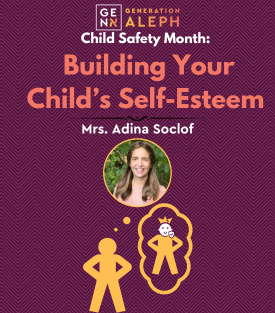As we continue to mine the precious Chinuch gems that are hidden within the Sugya of the Ben Sorer U’Moreh, we need to take a careful look at the origin story of this child. Who are the parents of such a young man? What value systems did they role model for their son?
A Jewish soldier goes out to war. A young and beautiful gentile woman is being held in captivity. War is a turbulent time. Seeing this captive woman, the young soldiers passions overtake him. The Torah grants a special dispensation and under certain conditions he is permitted to take her as a wife. He eventually marries her, and they have a child. Chazal teach us that it is that very child who grows up to become our Ben Sorer U’Moreh. Why? What did the father do wrong? Did the Torah not permit his marriage to the Yefas Toar, the beautiful captive woman? Rav Chaim Shmulewitz zt”l was known for saying, “If you stick your hand in fire, you are going to get burnt.” Getting burnt is not a punishment, it’s a consequence. The marriage to the Yefas Toar may have been halachikally permissible but it is indicative of a certain personality with a particular worldview. This is a soldier who has succumbed to lust. While it is understandable that in the midst of a war he was overtaken by his passions, the halacha was designed for him to come to his senses. For thirty days the Yefas Toar must sit in his house. In that time she cannot wear the attractive garments that she was wearing when she was captured. She cuts her hair short. She cannot make her nails look beautiful.[1] All of this is to say that we do our best to ensure that she looks disheveled so that the ardor of this soldier will cool off. But to no avail. He marries her anyway. This is clearly a man who is governed by his desires. And his child grows up in a home where there is a worldview of pursuing pleasure the sake of pleasure.
The Ibn Ezra[2] describes the Ben Sorer as והנה זה אפיקורוס, כי לא יבקש חיי העולם הזה כי אם להתענג בכל מיני מאכל ומשתה, a heretic who has no other desire in this world other than to eat and drink. The Chinuch (248) explains that one can only become a Ben Sorer U’Moreh from the time he has his Bar Mitzvah until three months later. This a time when a young man is filled youthful exuberance and the dangers of overindulging in materialistic pleasures can have extremely adverse consequences. He writes that most human sins are due to overindulgence in food and drink and that one who does so allows the physical matter to prevail over the spirit until it sickens and destroys it completely. Accordingly, Rashi[3] explains that the Torah follows the attitude of the Ben Sorer U’Moreh to its logical conclusion. He will end up destroying his father’s finances in the pursuit of pleasure. When he cannot obtain that which he is accustomed to having he will stand at the crossroads and rob people. Thus, the Torah says, let him die innocent and not guilty. Sadly, the father has passed on his desire for worldly pleasures to his son and it has led to his undoing.
Judaism is not an ascetic religion. There is no dignity in poverty. Some of our greatest leaders, including Moshe Rabbeinu[4] and Rav Yehuda HaNasi, were men of great wealth. But Judaism believes in possession, not ownership.[5] Materials are owned by Hashem, we are the trustees, and we are meant to use our possessions in accordance with the will of The Owner. We live in a society with an increased desire for materialism and extravagance and the Jewish community has not been immune to the culture we live in. I am not here to discuss Gvir Culture, much ink already been spilled on the conspicuous consumption of our community. I would however like to talk about the impact Gvir Culture has on our children. Rabbi Dovid Bashevkin, in an interview on the Kosher Money Podcast, framed the issue quite well. Highlighting the difference between the way we treat Gevirim (the ultra-wealthy) as opposed to the way that we treated them twenty years ago, Bashevkin says, “There’s a way that we treat them (Gevirim) differently…They’re always right… We turn them into celebrities and its terrible. You have kids in their twenties, can they name more Gedolim or Gevirim? Or even worse, have our Gevirim become our Gedolim? …This culture of who do you want to grow up to be? People want to grow up to be very wealthy Baal HaBaatim and that’s one scary, scary thing.” He’s right. One of the unintended consequences of a culture that celebrates extra-ness is that our children inevitably look up to those who have the most. We ought to be asking ourselves, can a child who grows up in a society that values wealth as an end and not as a means grow up with spiritual aspirations? What are the consequences for a child who grows up in an environment of overindulgence? This is not at all a commentary on how people should spend their money. Far be it from me or anyone to stand in judgement of others. Nor is it meant to cast aspersions on our community at large. We are a nation of Chesed par excellence and the amount of Tzedaka generated by our community boggles the mind. Still, one cannot help but notice, that the marketing in our community has changed dramatically over the past several decades. Everywhere we turn there is an ad for the newest frum luxury and excess. Do our material aspirations outweigh our spiritual aspirations? Are we as modest as we once were when it came to our material possessions? And if we are not, we ought to be seriously concerned about the messages we are sending to our children.
Chazal[6] tell us that Rav was accustomed to say, “The World to Come is not like this world. In the World to Come there is no eating, no drinking, no propagation, no business, no jealousy, no hatred and no rivalry. Rather, the righteous sit with their crowns on their heads and delight in the radiance of the Divine Presence.” It is an important sentiment to be sure but why did Rav constantly repeat this statement? Rav Nochum Zev of Kelm answered this question based on his own life experience. Rav Nochum Zev was a businessman and twice a year he would visit the fairs in Leipzig and Danzig. Doing business with German tradesmen required that he be proficient in the German language. And yet, while he spoke the language fluently, he was not necessarily familiar with the subtleties of German grammar. He spoke street German if you will. A bi-annual visit simply did not require that level of fluency. However, Rav Nochum Zev spoke perfect Lithuanian and was familiar with every aspect of the language. In contrast to Leipzig and Danzig, Kelm was his home. He knew the streets, the people, the culture. In classic Mussar fashion, Rav Nochum Zev explained that this must be true in our spiritual lives as well. This world is a place that we visit to do business. We have a job to do and therefore we must become proficient in the language of this world. We eat and drink and engage the material world that we inhabit. This is the language of our world. However, we are not required to have perfect fluency. That is reserved for spiritual matters. We are dwellers of Olam Haba and visitors in this world. But this world can easily grab hold of a person. We can become quickly confused and mistake this world as our destination. To ensure that he stayed appropriately oriented, Rav accustomed himself to saying, “The World to Come is not like this world. In the World to Come there is no eating, no drinking, no propagation, no business, no jealousy, no hatred and no rivalry. Rather, the righteous sit with their crowns on their heads and delight in the radiance of the Divine Presence.” Rav is not merely reminding himself of a theological truth, he is ensuring that while he is proficient in the language of this world, he does not overindulge in its material pleasures.
Every culture has a language with which we transmit our values. Language is not always the spoken word. From the ads that we run, to the people that we admire, we are communicating our ideals to the next generation. Make no mistake about it, our children are listening very carefully. The Ben Sorer U’Moreh followed in the ways of his father who took the Yefas Toar as a wife. It’s not a punishment, it’s a natural consequence. The child grew up in a home of overindulgence and he mimics the values of his role models. A child who grows up in a Gvir Culture aspires to be a Gvir and to quote Bashevkin once again, that is a scary, scary thing.
Rav Mordechai Burg is the Menahel of Mevaseret, Mashpia of NCSY Summer, Mashpia of Nitzotzos, author of Nitzotzos on Chumash and a senior Rebbe at Tomer Devorah and Bnot Torah Institute. His shiurim can be found on Nitzotzos.com.
[1] It is a Machlokes whether she must allow them to grow long or be cut short.
[2] Devarim 21:18
[3] Devarim 21:18
[4] Nedarim 38a
[5] see Vayikra 25:23 where we are told explicitly that the land must not be sold permanently because the land belongs to Hashem
[6] Berachos 17a
Submit your questions
"*" indicates required fields










